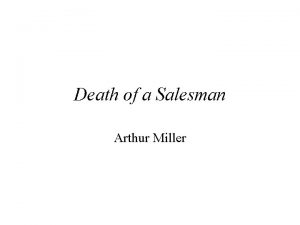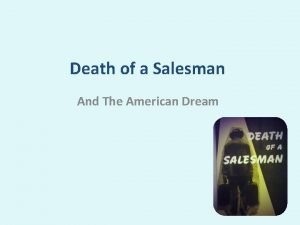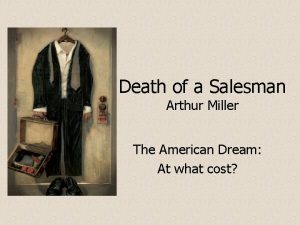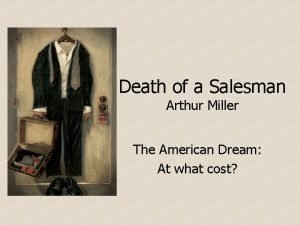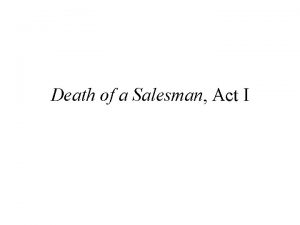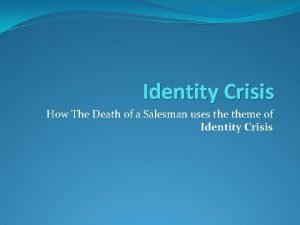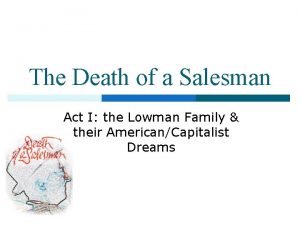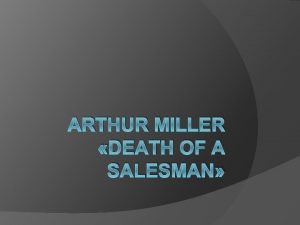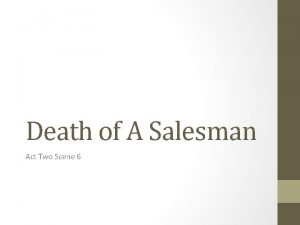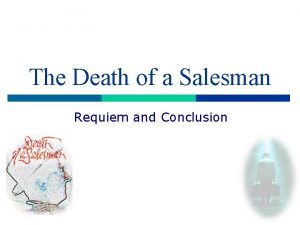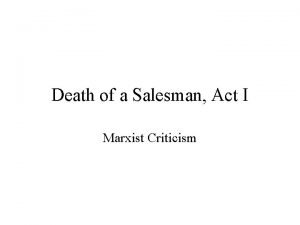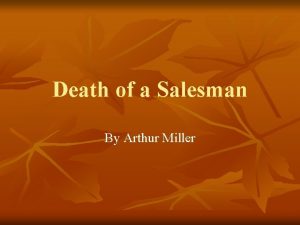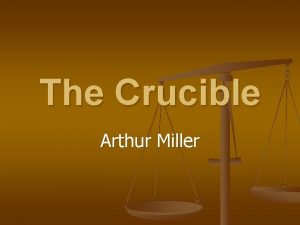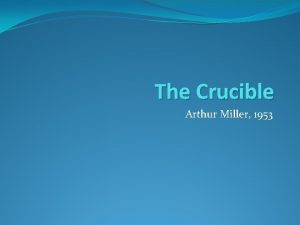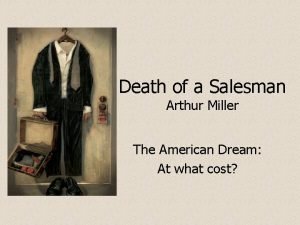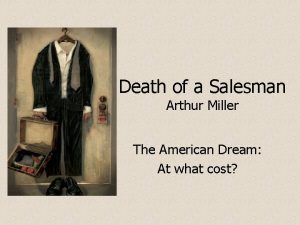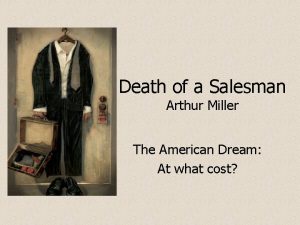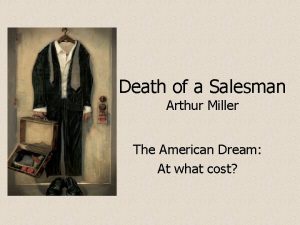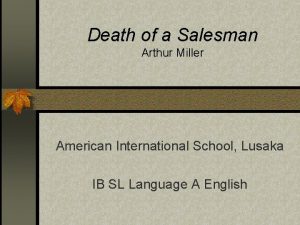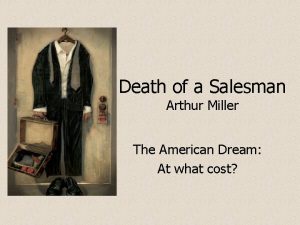Death of a Salesman Arthur Miller The American



















- Slides: 19

Death of a Salesman Arthur Miller The American Dream: At what cost?

About the Playwright: Arthur Miller Ø Born in New York City on October 17, 1915 Ø Began as playwright at University of Michigan Ø Pulitzer Prize winner for Death of A Salesman Ø Double winner of New York Drama Critics Circle Award

Miller’s Legal Troubles Ø Suspected of being a Communist sympathizer Ø Death of a Salesman seen as un- American Ø Miller has troubles with the HUAC/Mc. Carthy Ø 1953 - Miller denied a passport Ø 1955 - HUAC pressures NYC not to allow Miller to make a film for them on juvenile delinquency

The Saga Continues. . . Ø 1957 - Miller convicted of contempt of Congress for refusing to names And then. . . Ø 1958 - US Court of Appeals overturns his contempt conviction

From Classical Tragedy Ø Unity of time -- the final 24 hours in Willy’s life Ø Unity of action - the play is complete unto itself Ø the tragic hero…with a twist

Initial Themes Ø Addresses family conflict in post World War II America Ø Takes a close look at the price paid for the “American Dream” Ø Charges America with creating a capitalist materialism centered around a postwar economy Ø This materialism skewed the original view of the “American Dream” as envisioned by the founding fathers

Themes in Death Ø Willy Loman as a modern tragic hero Ø An individual’s search for meaning and purpose in life (not Willy, but Biff) Ø failure in pursuit of success Ø Man’s need to “leave a thumbprint somewhere in the world. ” Ø An examination of the materialistic values of society

Characteristics of the Tragic Hero "A man doesn't become a hero until he can see the root of his own downfall. " ~Aristotle Six Characteristics of the Tragic Hero: Ø Nobility or wisdom (by birth) Ø A flaw or error of judgment (Hamartia) Ø A reversal of fortune (perepetia) Ø The discovery or recognition that the reversal was brought about by the hero's own actions (anagnorisis) Ø The audience must feel dramatic irony for the character. Ø The character's fate must be greater than deserved.

A few key traits of the T. H. Ø Usually evokes empathy… Ø Has a weakness, usually pride Ø Something has gone awry in his/her life Ø Usually faced with a very serious decision he must make Ø Noble in nature Ø Must understand his mistakes… Ø Likely doomed from the start… Ø Begins his “journey” as no better or worse than the rest of us…

Miller’s Modern Tragedy Ø The hero is a common man. hero struggles against society. hero meets his downfall is a result of an incongruity between his own perception of the world and reality. Ø The hero achieves a kind of redemption in his downfall.

Major Characters Ø Willy Loman Ø Biff Loman Ø Linda Loman Ø Happy Loman Ø Charley Ø Bernard Ø Ben Ø The Woman Ø Howard Wagner Ø Stanley Ø Jenny Ø Miss Forsythe and Letta

Willy Loman Ø Father, traveling salesman Ø Believes in chasing the American Dream although he never achieves it Ø Pins his failed hopes on his sons, Biff and Happy Ø Becomes mentally ill when pressure of reality crushes his illusions

Biff Loman Ø Elder son, 34 years old Ø High school standout-football star, many male friends, and female admirers Ø Academic failures lead to a life of kleptomania Ø Represents Willy’s vulnerable, tragic side Ø Fails to reconcile his father’s expectations

Linda Loman Ø Loving, devoted wife Ø Naïve and realistic of Willy’s hopes Ø Emotionally supportive of Willy Ø Willy’s strength until his tragic perishing

Happy Loman Ø Younger son, 32 years old Ø In Biff’s shadow all his life Ø Relentless sex and professional drive Ø Represents Willy’s sense of self importance and ambition Ø Often engages in bad business ethics

Charley Ø The Lomans’ next door neighbor Ø Successful businessman Ø Often gives Willy financial support Ø Described sadly as Willy’s only friend although Willy is jealous of Charley’s success

Bernard Ø Charley’s son Ø Successful lawyer Ø Often mocked by Willy for being studious Ø Compared to Loman sons by Willy; they do not measure up to his success

Ben Ø Willy’s deceased older brother Ø Independently wealthy Ø Appears to Willy in daydreams Ø Willy’s symbol of success that he desperately wants for his sons

The Woman Ø Willy’s mistress Ø Her admiration for Willy is an ego boost Ø Biff catches Willy with her in a hotel room Ø Biff loses faith in his father due to infidelity
 Death of a salesman plot diagram
Death of a salesman plot diagram Daniel miller arthur miller
Daniel miller arthur miller Death of a salesman american dream theme
Death of a salesman american dream theme Setting of death of a salesman
Setting of death of a salesman What is the american dream in death of a salesman
What is the american dream in death of a salesman Death of a salesman theme
Death of a salesman theme Death of a salesman as an american tragedy
Death of a salesman as an american tragedy Summary death of a salesman act 1
Summary death of a salesman act 1 Death of a salesman author
Death of a salesman author Death of a salesman act 3
Death of a salesman act 3 Florida idea death of a salesman
Florida idea death of a salesman Expressionism death of a salesman
Expressionism death of a salesman Death of a salesman act 1 summary
Death of a salesman act 1 summary Death of a salesman shmoop
Death of a salesman shmoop What is the climax of death of a salesman
What is the climax of death of a salesman Death of salesman conclusion
Death of salesman conclusion Death of a salesman marxist criticism
Death of a salesman marxist criticism Death of a salesman act 1 questions
Death of a salesman act 1 questions Death of a salesman historical context
Death of a salesman historical context Naturalism in death of a salesman
Naturalism in death of a salesman
